From an exhibition held in school, June 2015.
The morning of Thursday 20th June 1940 dawned brightly on the Island of Guernsey, a typical summer's day for the children as they prepared for an outing with their school. They could not have imagined that five years would pass before they once again awakened in their own beds.
When Nazi invasion of the Channel Islands became inevitable the decision was taken to evacuate, primarily due to the islands' inability to feed their inhabitants should the ports become blockaded. Pre-school children with their mothers, and school-aged children in the care of their teachers were the first to leave for the relative safety of England. A total of ten thousand people, a quarter of the population, were evacuated from Guernsey on that day; among them were 4700 schoolchildren and 95% of the island's teachers.
Many of the schools were sent to towns in Lancashire. The boys of the States Intermediate School of Guernsey eventually arrived at Oldham Mumps Station where they were met by various local dignitaries including Mr Harry Shaw in his role as Commandant of the Special Constabulary. H B Shaw, who was also headmaster of the Hulme Grammar School for Boys, had spent three years at the Guernsey High School when his father was situated there as a Methodist Minister, and was married to a woman from Guernsey, so he already had many connections to the island.
The boys were taken to Hill Stores in Oldham where they found paillasses laid out on the floor ready for them. They were looked after by the Women's Voluntary Service for the next few days and very soon one lady, and then another decided to take a boy into their own home. The appeal for suitable homes met a ready and willing response from the warm-hearted women of Oldham. For the next five years these temporary parents of the Guernsey boys always turned out for speech day, and on sports day they would cheer on their newly acquired son. Many of the boys retained a lifelong friendship with their Oldham families.
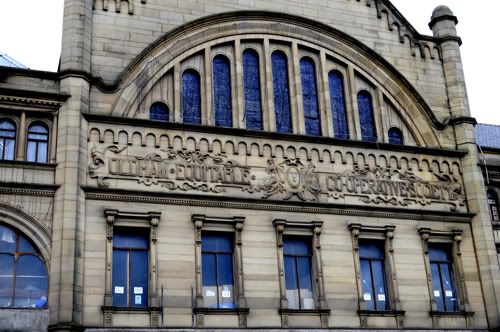
Hill Stores on Huddersfield Road, Oldham. The store belonged to the Oldham Equitabe Co-operative Society and had a ballroom on the upper floor.
Photo: Hidden Shadow.
The headmaster Mr F E Fulford, and staff of the Intermediate School decided that, since they had all of their teachers, they would prefer to continue to run their school as normal if suitable premises could be found. Mr Shaw was greatly pleased to be able to accommodate the upper forms at Hulme, while the lower forms went to Hollins Central School. Similar arrangements were made by the Intermediate School for Girls in Rochdale, Elizabeth College in Buxton, the Ladies College in Denbigh and the elementary schools at various other towns in north-west England. The children who came to England received a normal education during the war years which was very different to the educational options for the children remaining on Guernsey; they had few teachers, none of whom were qualified to teach beyond elementary level, and many of the school buildings, including the Intermediate School, had been taken over by the Germans. In England the children remained with their friends and their teachers which must have helped immensely when many were apprehensive and upset at being separated from their parents and siblings.
In March 2012 two members of our archive team, Margaret Castleton and Jean Sanders, were able to travel to the Intermediate School in St Peter Port to interview some of the 'Guernsey Boys' who had come to Oldham and to Hulme. Roy Martin, Alan Mauger, and brothers Michael and Francis Paul, pupils at the Intermediate School, had travelled on the Batavier IV, a Dutch cargo ship which had been used in the evacuation of Dunkirk and, most recently, used to transport cattle. John Lainé, a pupil at Hautes Capelles School, had travelled with his siblings on the Viking.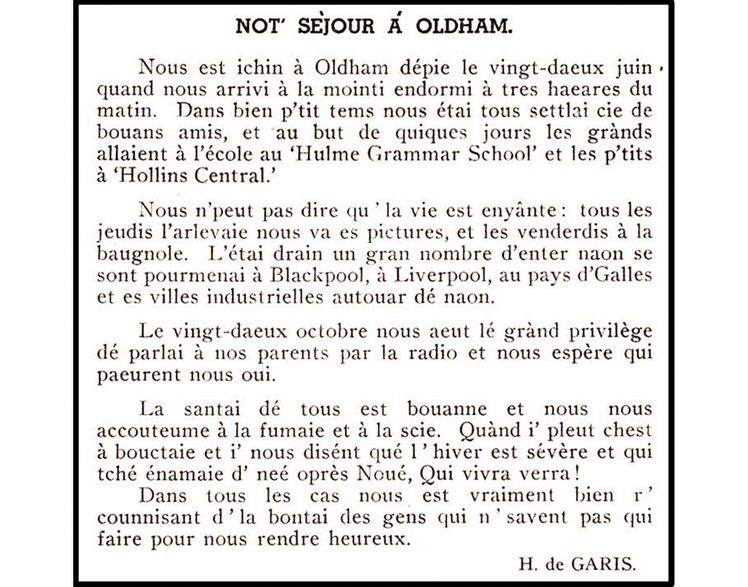
An article from The Oldham Hulmeian Magazine written in Guernsey patois.
When asked about their memories of the journey they recalled the cramped and dirty ships, with girls being accommodated below deck but the boys having to make the best of it on the top deck where the possible sighting of a German U-boat prompted every boy on deck to run to one side causing the boat to list but fortunately not to capsize. They marvelled at the sunken boats in Weymouth Harbour, and many of the younger ones were frightened by their first sight of a steam engine (Guernsey did not have a railway).
During the journey north they were most intrigued to find that all the cows in England were black and white and the buses had a top deck. Arriving at Oldham Mumps they were met by an interpreter because someone in authority had thought that they would be French-speaking. As one of the old-boys mentioned, it was the Guernsey people who needed an interpreter as they found an Oldham accent rather difficult to understand. Incidentally, the local patois of Guernsey was almost lost after the war as few returning children, having not heard the language for five years, were no longer fluent. It was remarked that most of the children returned with a good Lancashire accent.
By the time the school term started the boys had settled into their new homes and, as local Oldham people commented, they had easily adapted to the way of life of the local children. Their lessons continued at Hulme separately from the Hulme boys although they often joined in the assembly and every year joined the Hulme boys for the Founder's Day and Armistice Day Services. They provided their own football and cricket teams and regularly played matches against the other local schools. Speech Day was held annually in either the School Hall or at Oldham Town Hall.
Editions of The Intermedian, the magazine of the States Intermediate School were published as part of The Oldhan Hulmeian, the Hulme Grammar School for Boys magazine throughout the war years. An excerpt from the editorial of the December 1940 edition of The Intermedian shows the gratitude of the Guernsey boys to their new friends in Oldham: "It was no fun to be turned out of our homes and our homeland at such short notice, to leave our parents behind, to cross a perilous sea, to face the great unknown, and literally to be sent into exile, leaving an Island where we were serenely happy and very content, an Island renowned for its sunlit seas and glorious scenery, its warmth and beauty, its ease and serenity, its calm and peacefulness, but our sadness has been brightened, our burden lightened, our parting eased, our stress appeased, our exile sweetened, our gratitude deepened, by your warm reception and generous hospitality."
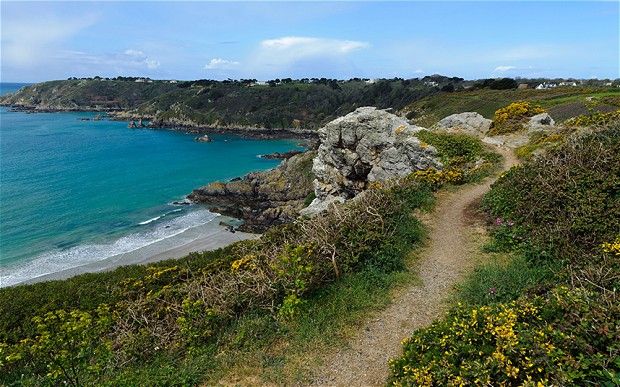
A View of Guernsey
The people of Oldham certainly made the boys feel welcomed. They were allowed, free of charge, a weekly visit to one of the four Oldham cinemas, to the swimming baths on Union Street or at Chadderton, to matches at Boundary Park and, for the older boys, the use of the boating lake and putting green at Alexandra Park. The boys also discovered the delights of snow as Guernsey rarely had even a sprinkling and Oldham suffered a severe winter with heavy snow in 1940-41. A pastime of the local boys, that of sliding down a slagheap on a roof tile, also provided plenty of entertainment.
During the Easter vacation of 1941 boys from both Oldham Hulme Grammar School and the States Intermediate School joined a forestry camp in the Lake District where they cut, trimmed and stacked logs for use as pit props. Flight 601 (Oldham Hulme Grammar School) of the Air Training Corps was established at school, commanded by Flying Officer Ferdinand Copeland, the Hulme PT instructor. Mr Alec Rose, a teacher at the Intermediate School, assisted as a Pilot Officer along with Mr H G Higgins, and later Mr E S Jones of the Hulme staff. All officers were commissioned to the RAF volunteer reserve. Many of the older boys from both schools joined the ATC, some later gaining commissions in the RAF. During the war years the boys learned navigation, signals, Morse, radio, and experienced assault course training and weapons maintenance.
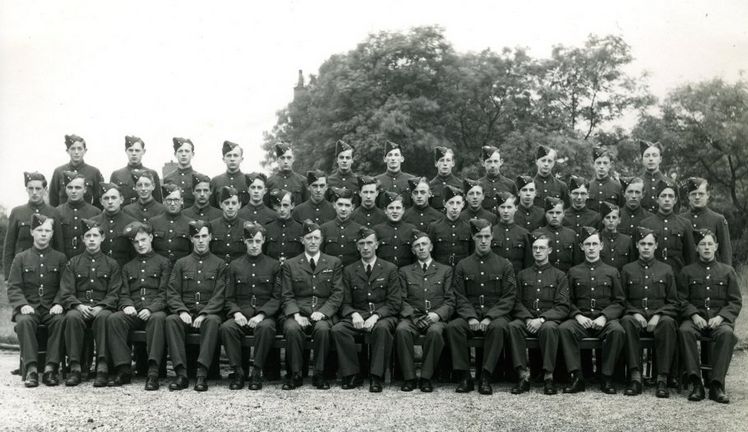
Members of Flight 601 (Oldham Hulme Grammar School) of the Air Training Corps. The Flight included a number of Guernsey boys.
Photo: George E Rowland & Son.
Published in The Oldham Hulmeian, July 1942.
In 1942 a Kestrel aircraft engine was obtained and, under the guidance of a civilian instructor, Mr Fitton, was transformed into its component parts in one of the basement rooms. By 1943 their instruction included armaments training with the local military and at Diggle Rifle Range. Mr Rose of the Intermediate School took command of the unit when Mr Copeland left. Mr Nield joined to train the boys in aircraft recognition, navigation and calculations. They regularly visited local RAF Stations and twice a year attended a week's camp at an RAF Station where many of the boys had the opportunity to go up in an aeroplane. The boys were joined in many of their ATC classes at school by men in the RAF reserve who were awaiting assignment.
An Army Cadet Force was started at school in 1943 for boys aged 14 to 16. Many of the younger Guernsey boys joined along with the Hulme Boys. There was also a local Naval Cadet Unit in which a number of Guernsey boys took part.
Masters of both schools also undertook fire-watching duty at night and during the weekends and holidays, helped in later years by senior students, because there were insufficient fire-watchers locally to cover the school.
As all of the Guernsey secondary schools were running normally in England the children advanced through the school system as they would have done in Guernsey. Every summer boys left school to go into the workplace, and eleven-year-olds who had won a scholarship would move to the Intermediate School. Many of the older boys found employment locally when they left school at 16 and although most entered the armed forces at 18 they had already completed two years or more in a trade. Headmaster Mr Fulford was slightly perturbed that those who had gone into the cotton mills and machine tool shops as mechanics would find on their return to Guernsey that no such careers existed in their homeland. He arranged for a number of leavers each year, particularly those from farming families, to go to an agricultural college in Lincolnshire where they could be trained for work in Guernsey's main industry of 'growing'. For the younger boys, transferring to the Intermediate School meant moving to another part of the north-west and finding a new family with which to live.
The boys interviewed by the archive team members had rather different stories to tell of their time in England.
Roy Martin left the Intermediate School at age 16 after a year in England. He had been living with a retired couple in Uppermill and found employment making aero-plane instruments at Measurements in Dobcross. A keen sportsman he had played both football and cricket for the Intermediate School and immediately joined the Measurements team.
Soon he was encouraged to try for Oldham Athletic and, being successful, signed an amateur contract with them. He played for Latics for more than two seasons. Incidentally, two further Intermediate School boys, Sylvester Rabey and Bill Spurdle also played for Oldham Athletic during the war years.
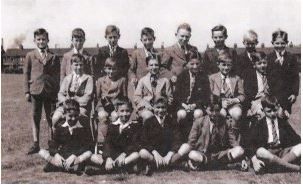
Michael Paul (top left) and classmates of the States Intermediate School.
Photo: Collection of Michael Paul.
The Paul Brothers, Michael and Francis, said they had felt privileged because their father Louis was a teacher at the Intermediate School so they had come to England as a complete family. They lived at the house of Miss Evelyn Hamilton on Windsor Road and were able to remain there throughout the war. Alan Mauger lived with the Brewer family on nearby Newport Street.
John Lainé was one of five children and had initially come with three brothers to the Nantwich area of Cheshire where the Guernsey Hautes Capelles School had found a home. A year later he left his siblings when he won a scholarship to the Intermediate School. His twin brother won a scholarship to Elizabeth College at the same time. He moved to Oldham and was taken in by the Hughes family who lived on Incline Road. Within weeks of arriving, the house was bombed in the middle of the night and the boy with whom he shared a bedroom was killed. John was buried under the rubble until a fireman rescued him. The mother of the house had also been killed. The husband and daughter of the family took John with them when they moved in with local relatives on Roman Road. Two years later a younger brother joined him at the Intermediate School while the youngest brother remained in the Nantwich area and still lives there now.
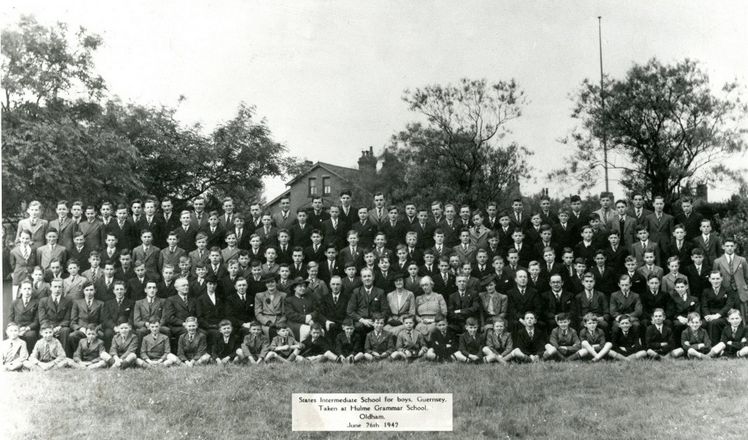
Staff and pupils of the States Intermediate School, Guernsey, taken at Oldham Hulme Grammar School, July 1942.
Staff on the second row, left to right (with their wives):
Mr Williams, Mrs Williams,
Mr Cecil Le Pelley, Mrs Le Pelley,
Mrs Warner, Mr Warner (Deputy Headmaster),
Mr F E Fulford (Headmaster), Mrs Fulford,
Winnie Jones (Junior Boys Pastoral),
Mr Alec Rose, Mrs Rose,
Mr Louis Paul, Mr Gibbons.
Photo: Oldham Hulme Grammar School Archives.
At least 137 boys initially came to Oldham with the Intermediate School. In August 1945 those who were still boys would finally return to their homeland after more than five years in England. Many of the older boys who had made a successful career remained in England, while others were still engaged in the armed forces for some time after the end of the war. Sadly two boys had died of illness while in England.
In his address to Speech Day in 1943 Headmaster Mr Fulford said that the daunting task presented to him and his staff of taking responsibility for the welfare of so many boys was greatly alleviated by the help and goodwill of the people of Oldham, from the Mayor and his council, to local businesses, the staff of Hulme Grammar School and Hollins Central School, and particularly the families who had become foster parents to the Guernsey Boys. His speech is reported thus:
"Three years ago their precipitous exodus from Guernsey, then seriously menaced by the enemy, had been made in a Dutch cargo boat. He deemed it fortuitous that they had come to Oldham, although the industrial North, with its railways and mills, factories and mines, soot and grime, bustle and noise, clogs and shawls, short summer and long severe winter, was indeed a great contrast to the mild winter and sunny days, the clear sky and blue sea, the red rocks and flaming gorse, the whispering waves and fragrant breezes, the acres of glasshouse and abundant tomato, the broad expanse of beach and beflowered cliffs, and most of all to the peace they had left behind. He assured his audience however that their problem of re-orientation on arrival, of adjusting themselves to the diametric change from sunny Guernsey to sooty Oldham, and of adapting themselves to their new and strange surroundings was solved almost on arrival by Mr Harold Wrigley, chief billeting officer, by Mr Harry Shaw and by all of the foster parents to whom he expressed his heartfelt thanks for their loving care and devotion."
References:
The Oldham Hulmeian, 1939-1945, Hulme Grammar School for Boys, Oldham.
The Intermedian, 1940-1945, The States Intermediate School for Boys, Guernsey.
History in an Hour, The Experience of Guernsey Evacuees in Northern England, http://www.historyinanhour.com/2011/10/18/guernsey-evacuees-world-war-two
Guernsey Evacuees, The Forgotten Evacuees of the Second World War, Gillian Mawson, 2012.
A Critical History of Education in Guernsey under German Occupation, John Crossley Hayes, 1947.
The Guernsey Literary and Potato Peel Pie Society, Mary Ann Schaffer and Annie Barrows, 2010.